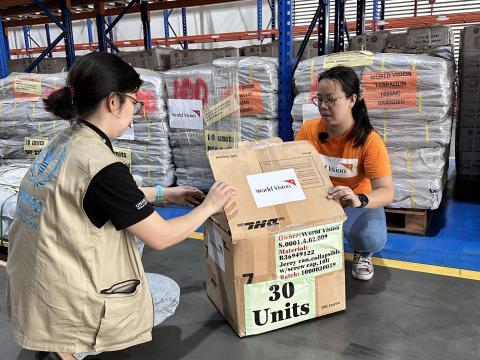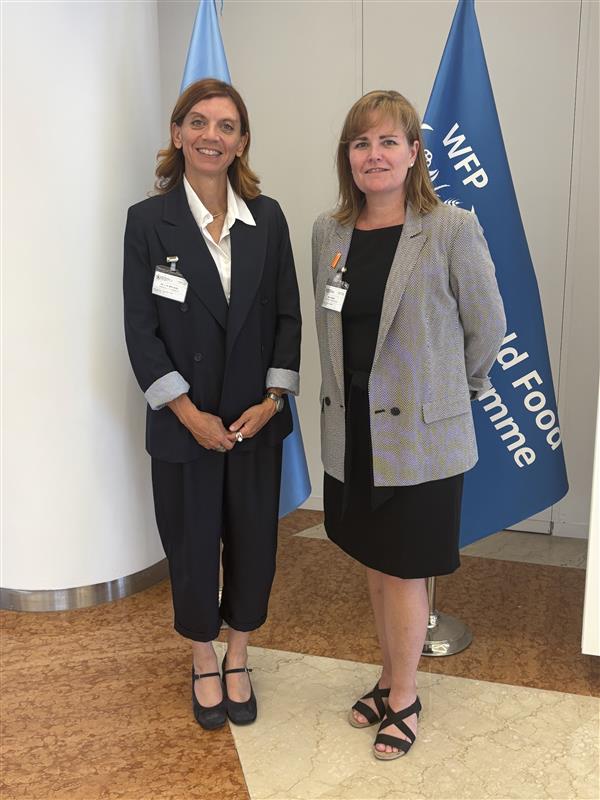Strategic partnerships are key to sustain effective humanitarian action in a Volatile, Uncertain, Complex, and Ambiguous (VUCA) environment

As World Vision, we have recently paused to reflect on the meaning of the word “partnership”, starting from the word etymology - “sharing or partaking in anything”. Over the years, the organisation has indeed shared its pathway with strategic and operational stakeholders at local, regional and international levels. And yet, research conducted into the origins of the WFP and World Vision International partnership has unveiled that there is nothing quite like the three-decades-long journey shared by the two organisations.
For more than 30 years, WFP and World Vision have shared a mutual determination to raise the support and resources needed to continue serving the most vulnerable people, especially children. WFP and World Vision continue to partner around a realistic and ambitious plan, one that leverages the organizations’ extensive expertise, comprehensive operational capabilities, and unrivalled global reach to combat hunger and address the causes of food insecurity, despite our current era of geopolitical rifts and funding shifts.
“It has never been harder to be a humanitarian”. With this stark reminder, WFP Executive Director, Ms Cindy McCain, opened the Annual Session of the WFP Executive Board, which took place from 23 to 26 June in WFP HQ (Rome, Italy). Building on the outcomes of the EB's First Regular Session, World Vision was the only INGO to attend the event in person, a testament to the shared journey with WFP, especially at a time when global needs are rising and having access to people is increasingly difficult, at times impossible. During the Annual EB session, WFP charted its confident course for the future, setting out the organisation's vision and direction for the next few years, which will enable WFP and partners like World Vision, to navigate the new humanitarian landscape, ensuring that resources and efforts are targeted where they will achieve the greatest and most durable impact.
A pivotal moment of the session was the Executive Board's approval of the WFP Localization Policy, which places local and national actors at the centre of WFP’s efforts to end hunger, recognising their contributions as first responders and as stewards of local knowledge and experience in humanitarian and development work. A localization implementation plan was also presented, highlighting the centrality of partnerships and coordination. The policy and related implementation plan represent a paradigm shift that is fully aligned with World Vision's commitments and priorities. As WFP’s preferred enabling partner, WV will continue to shape and influence the shift from policy to action by contributing to the creation of conditions for scaled, sustainable, and locally led solutions, and paving the way for strategies that build on national capacity gains and safeguard accountability to all affected people.
In 2024, WFP worked with 927 NGO partners, and nearly two-thirds of WFP’s assistance on the ground was implemented by or jointly with NGO partners. Against this backdrop, it is even more compelling to note that the WFP and World Vision partnership focused on providing evidence on the impact of ration cuts on communities and food security was included in the EB evaluation of WFP’s role in the collective humanitarian response (2024). In particular, Hunger, Harm, and Hard Choices, a study conducted across 13 crisis-affected contexts to assess the impact of reduced food assistance, was carried out from January to April 2025 in close collaboration with WFP. The research involved over 5,000 household surveys and dozens of focus groups and interviews, and its findings were used during the EB as a dire warning of the catastrophic consequences we may face on food security, education, child protection, and health, if current trends of underfunded humanitarian responses continue unabated.
On the margins of the EB Annual Session, a series of bilateral meetings were conducted by WFP and WVI leadership to discuss the continued sharing of technical expertise. They thought leadership in key partnership areas at local, regional and HQ levels (Food Security, School Meals, Integration of Food Security and Child Protection, Hunger, Resilience, Localisation, Financial Inclusion, Innovative Financing, Private Sector Engagement, Data Protection and Interoperability).

Our lasting, complementary and positive partnership with WFP has impacted the lives of millions of children in urgent need, across the world. In a Volatile, Uncertain, Complex, and Ambiguous (VUCA) environment, a strong, unwavering commitment towards ending hunger, shaped by a strategic external engagement approach, nurtured by a common purpose, and inspired by a shared mission, is imperative.